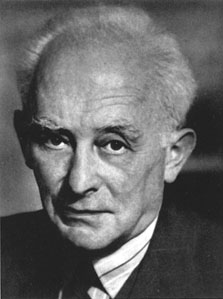| Max Born  Born: 11-Dec-1882 Born: 11-Dec-1882
Birthplace: Breslau, Germany
Died: 5-Jan-1970
Location of death: Göttingen, Germany
Cause of death: unspecified
Remains: Buried, Göttinger Stadtfriedhof, Göttingen, Germany
Gender: Male
Religion: Jewish
Race or Ethnicity: White
Sexual orientation: Straight
Occupation: Physicist Nationality: England
Executive summary: Pioneer of quantum mechanics Military service: German Army (1915-19) Physicist Max Born is best known for his statistical analysis of how subatomic particles behave. His studies of the wave function led to a reassessment of the original quantum theory, replacing the explanation of electrons as particles with a more accurate mathematical and statistical interpretation of the observed behavior of electrons. His work added to the scientific understanding of the inherently probabilistic nature of the basic laws of quantum mechanics, and earned the highest honor in science, the Nobel Prize for Physics, in 1954.
In 1921 he offered the first mathematically precise statement of the First Law of Thermodynamics. In 1925, Born and Werner Heisenberg formulated the matrix mechanics representation of quantum mechanics. In 1926 he published a groundbreaking clarification of the probability density function in Erwin Schrödinger's equation of quantum mechanics. In 1927, with Robert Oppenheimer, he formulated the Born-Oppenheimer approximation, a calculation in quantum chemistry for determining the energy and wave function of an average-size molecule. He was born in Breslau, Germany (now Wroclaw, Poland) and was Lutheran by faith, but he was Jewish by heredity and thus was forced to flee for his life after the Nazis took power. He became a British citizen in 1939, and spent the last years of his career teaching and writing at the University of Edinburgh. He was the maternal grandfather of actress and pop singer Olivia Newton-John.
Both formally and informally, he had a long-running debate with his friend Albert Einstein on the quantum nature of the universe. It was in a letter to Born that Einstein wrote his oft-misquoted line "God does not play dice", though what Einstein wrote is more completely and accurately translated as, "The theory says a lot, but does not really bring us any closer to the secret of the Old One. I, at any rate, am convinced that He does not throw dice". In this conceptual battle of determinism versus indeterminism, Born argued the opposite position from Einstein, now increasingly accepted — that even systems obeying precise laws can and do behave in a random way, a randomness of nature at its tiniest level suggesting that whatever the Old One or God might be, in a sense He She or It does play dice. Father: Gustav Born (anatomist, b. 22-Apr-1850, d. 6-Jul-1900)
Mother: Margarete Kauffmann (b. 22-Jan-1856, m. 7-May-1881, d. 29-Aug-1886)
Sister: Käthe Born Königsberger (b. 5-Mar-1884, d. 1953)
Mother: Bertha Lipstein (stepmother, b. 1866, m. 13-Sep-1891, d. 1937)
Brother: Wolfgang Born (half-brother, b. 21-Oct-1892, d. 1949)
Wife: Hedwig Ehrenberg (b. 1891, m. 2-Aug-1913, d. 1972, one son, two daughters)
Daughter: Irene Born Newton-John (mother of Olivia Newton-John, b. 1914)
Daughter: Margarethe Born Pryce (b. 1915, d. 2000)
Son: Gustav Victor Rudolf Born (pharmacologist, b. 29-Jul-1921)
High School: König Wilhelm Gymnasium, Breslau, Germany
University: University of Wroclaw (attended 1901-02)
University: University of Heidelberg (attended 1902-03)
University: University of Zurich (attended 1903-04)
University: PhD, University of Göttingen (1907)
Scholar: Cambridge University (1907-08)
Scholar: University of Wroclaw (1908-09)
Lecturer: University of Göttingen (1909-14)
Lecturer: University of Berlin (1914-15
Professor: University of Frankfurt (1919-21)
Professor: University of Göttingen (1921-33)
Lecturer: Stokes Lecturer, Cambridge University (1933-36)
Professor: Indian Institute of Science, Bangalore (1935-36)
Professor: Tait Professor of Natural Philosophy, University of Edinburgh (1936-53)
Cambridge Stokes Medal 1934
MacDougall-Brisbane Medal 1945
Max Planck Medal 1948
Hughes Medal 1950
Nobel Prize for Physics 1954 (with Walther Bothe)
Hugo Grotius Medal for International Law 1956
Grand Cross of Merit with Star of the Order of Merit 1959
German Academy of Science
Indian Academy of Sciences (Foreign Fellow)
Royal Society 1939
Royal Society of Edinburgh
Royal Swedish Academy of Sciences (Foreign Member)
Russian Academy of Sciences (Foreign Member)
Converted to Lutheranism from Judaism (1913)
Nervous Breakdown
Naturalized UK Citizen 1939
German Ancestry
Jewish Ancestry
Polish Ancestry
Lunar Crater Born (6.0° S 66.8° E, 15 km. diameter)
Risk Factors: Bell's Palsy
Author of books:
Dynamik der Kristallgitter (Dynamics of Crystal Lattices) (1915, non-fiction)
Die Relativitätstheorie Einsteins und ihre Physikalischen Grundlagen (Einstein's Theory of Relativity) (1920, non-fiction)
Einstein’s Theory of Relativity (Mechanics of the Atom) (1925, non-fiction)
Probleme der Atomaren Dynamik (Problems of Atomic Dynamics) (1926, non-fiction)
Elementare Quantenmechanik (Elementary Quantum Mechanics) (1930, non-fiction; with Pascual Jordan)
Optik: Ein Lehrbuch der elektromagnetische Lichttheorie (Principles of Optics) (1933, textbook; with Emil Wolf)
Moderne Physik (Modern Physics) (1933, non-fiction)
The Restless Universe (1935, non-fiction)
Natural Philosophy of Cause and Chance (1949, non-fiction)
My Life & My Views (1968, memoir)
The Born-Einstein Letters (1971, correspondence; posthumous, with Albert Einstein)
Requires Flash 7+ and Javascript.
Do you know something we don't?
Submit a correction or make a comment about this profile
Copyright ©2019 Soylent Communications
|